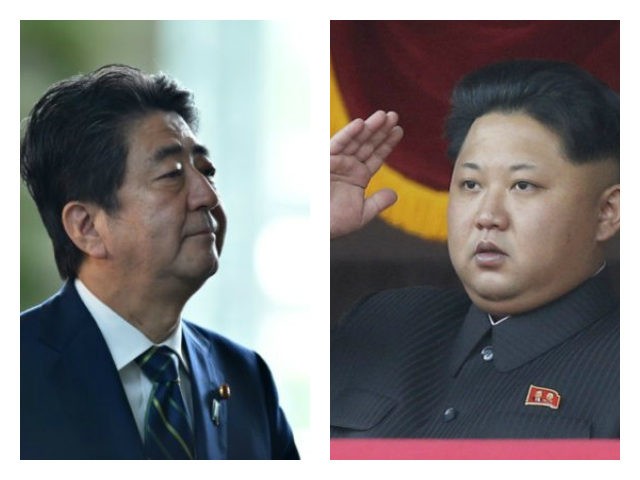North Korea’s state media, once singularly focused on insulting the United States, has shifted targets to Japan, publishing warnings that “half-witted Japanese politicians” threaten the success of North Korea’s charm offensive towards South Korea and the United States.
Imperial Japan ruled all of Korea for decades after invading in the early 20th century. The rise of Kim Il-sung and establishment of the Democratic People’s Republic of Korea (DPRK) replaced the brutal Japanese rule with the repressive communist personality cult currently in power.
Following the establishment of North Korea, the Kim family regime launched a campaign to abduct Japanese civilians and force them to train Korean spies in how to most effectively infiltrate Japanese society. Japan has documented 800 cases of such missing citizens; North Korea has admitted to 13.
Prime Minister Shinzo Abe has maintained unilateral sanctions on North Korea and increased the number of them following a missile launch last year that threatened much of northern Japan.
In a column published Tuesday, Rodong Sinmun, the North Korean state newspaper, vehemently objected to those sanctions, decrying “half-witted Japanese politicians” who are allegedly seeking a “way-out” [sic] from tensions with North Korea.
“Japan is resorting to a sleight of hand to cross the doorsill to Pyongyang even by flattering the American master, neighboring big powers and even the south Korean authorities,” Rodong Sinmun assessed, “But it will never step on the sacred land of the Republic unless it drops its inveterate repugnancy and bad habit.”
The Japanese government, the newspaper continues, is clearly “not ready to join the trend of the times” because it is “finding fault with this or that.” The trend that the newspaper appears to be referring to is that of opening up ties to North Korea. Dictator Kim Jong-un made the first visit of someone in his position to South Korea last month, meeting South Korean President Moon Jae-in, and will soon meet with U.S. President Donald Trump. On Tuesday, the Chinese government announced that Kim had met Xi Jinping in Dalian, a coastal town in northern China, to discuss preparations for talks with Trump, among other topics. Abe has expressed no significant interest in meeting with Kim.
Rodong Sinmun predicts that Japan’s relatively subdued diplomatic behavior lately is “going crafty to cross the river by clinging to the horse tail, while waiting for the result of the DPRK-U.S. dialogue.”
“What it has to remember is that it can never evade the fate of left-out person if it behaves disgusting [sic] while repeating the old cliche of ‘sanctions’ and ‘pressure’ as now [sic],” it advises.
“Japan has to correct its ill practices before making preparations for journey [sic],” the story concludes.
The Korean Central News Service (KCNA), another state outlet that acts largely as a news service, insulted Abe in a piece on Monday, claiming that he “recently talked rubbish that Japan would never be excluded from the process of denuclearization of the Korean peninsula and he expects detailed actions for the denuclearization.”
Japan’s “ill-behavior, at a time when the atmosphere of reconciliation and peace is being created thanks to the proactive step and sincere efforts of the DPRK, clearly shows the real intention of the political dwarfs seized with anachronistic way [sic] of thinking,” KCNA argued.
Abe and his government “should feel ashamed of itself,” the piece concluded.
China, South Korea, and the United States, contrary to North Korea’s claims, do appear to be making efforts to include Japan in regional negotiations on ending the illegal North Korean nuclear weapons program. Japan will be hosting a summit uniting Abe with Chinese Premier Li Keqiang and South Korean President Moon Jae-in on Wednesday centered around policies toward North Korea. Such gatherings are a semi-annual occurrence but have taken on a heightened importance in light of talks with North Korea.
Li has already arrived in Tokyo, according to the Japanese newspaper Asahi Shimbun, after declaring in a column for the newspaper that “I want to promote a sound and stable development of our bilateral relationship for the long term.” Japan and China also have a fractured relationship due in part to Imperial Japan’s war crimes in China in the first half of the 20th century, but also because of modern Japan’s closeness to the United States. China and Japan also have an ongoing territorial dispute over the Senkaku (Diaoyu) Islands in the East China Sea.
In addition to North Korea, Li expected in-person talks with Shinzo Abe to yield some mutually-beneficial trade agreements, he said.
Prior to Li’s departure to Japan, Kim Jong-un arrived in northern China, sharing a “welcome banquet” with Xi Jinping in Dalian. China’s state media revealed the trip on Tuesday, reporting that Xi felt “happy” that Kim would make a second trip to China in two months.

COMMENTS
Please let us know if you're having issues with commenting.